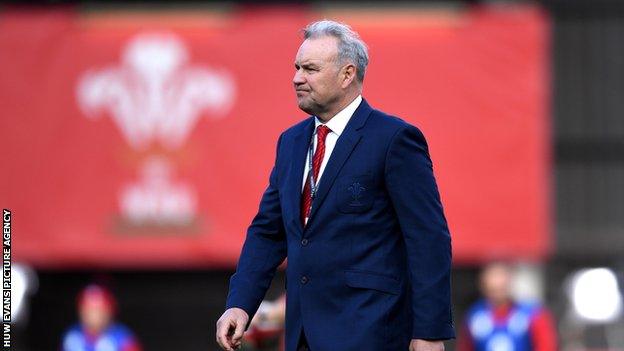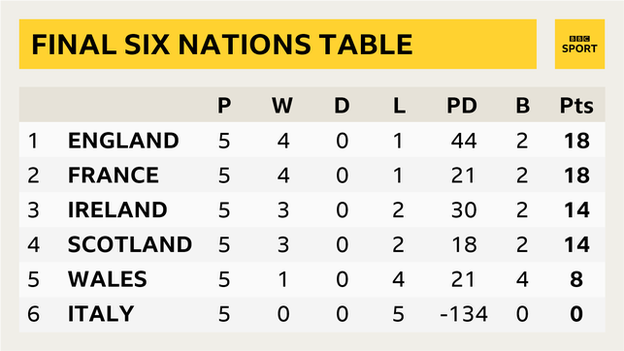Six Nations: Wales inquest begins into worst tournament performance since 2007
- Published
Wayne Pivac says Wales need to start winning
From Six Nations champions to Wales' worst tournament in 13 years.
That is the stark statistic Wales woke up to today after a dire defeat by Scotland at an empty Parc y Scarlets.
England are celebrating being crowned 2020 Six Nations champions following a subdued "Super Saturday" played behind closed doors in Llanelli, Paris and Rome.
France and Scotland might also reflect on positive campaigns after an historic tournament that lasted nine months.
In contrast, the inquest into the performance of Wayne Pivac's side begins on the back of their floundering fifth-place finish.
The alarm bells were chiming lightly before this weekend. Following some Halloween horrors against Scotland, the noise is that bit louder.
This was one of Wales' poorest performances in modern memory, one that spectacularly failed to mark Alun Wyn Jones' achievement of becoming the world's most-capped international.
It is now seven losses in eight matches for Wales, while this was a fifth straight defeat for Pivac, whose only international success was a 42-0 win over Italy in February.
In mitigation, it was a challenging year in which to come into the job, though every nation has had the same hurdles to contend with.
So it has been a woeful 2020 so far for Wales, who have gone from being ranked fourth in the world to finishing fifth in Europe.
The results could have looked more depressing with two Tests in New Zealand this summer cancelled because of the Covid-19 pandemic.
It is not over yet, with four matches ahead in the Autumn Nations Cup, starting with Ireland in Dublin on 13 November.
Six Nations 2020 Highlights: Wales 10-14 Scotland
Wayne's world
Twelve months ago today, Warren Gatland ended his 12-year tenure as Wales coach after defeat to New Zealand in the World Cup bronze medal match.
Following Gatland was always going to be a tough task, for he transformed the Wales national team. There were three Grand Slams, four Six Nations titles and two World Cup semi-finals on his watch.
Pivac had a year to prepare with his appointment announced early. It is fair to say his first 11 months in charge have not gone to plan, with Wales regressing in almost every department.
So what has gone wrong? Following the seven month break in international rugby because of coronavirus, the defeats against France and Scotland have been concerning.
The breakdown battle and indiscipline have been key issues for Wales in both games.
Eleven out of the 16 penalties conceded against Scotland came at the contact area, with Wales' much vaunted back-row depth being tested.
Ross Moriarty, Josh Navidi and Justin Tipuric had been stalwarts of the later Gatland era but the trio were missing against Scotland through illness and injury.
New cap Shane Lewis-Hughes, Taulupe Faletau and James Davies failed to combat a Jamie Ritchie-inspired visiting trio. Lewis-Hughes was a small positive as he demonstrated his defensive qualities with 21 tackles but Wales have been dominated up front in two games as they have missed Navidi's physicality especially.
With Lewis-Hughes added to the resistance ranks, the defence actually improved against Scotland with only one try conceded, although the ease with which Wales allowed the Scotland driving maul to cross their line infuriated forwards coach Jonathan Humphreys.
The defensive damage had been done in the previous four matches, with 16 tries leaked during the five-game losing streak.
Defence coach Byron Hayward is still looking to fill the shoes of Shaun Edwards, who left Wales for France.
In attack, it is difficult to see what Wales are attempting to achieve, although hopes of incisive movements have not been aided by a lack of forward foundations and barnstorming ball-carriers.
Scarlets played an adventurous, attacking approach under Pivac and Stephen Jones.
When the duo were appointed by Wales, the romantic view was that they would widen the Gatland game-plan, which was often portrayed as one-dimensional and predictable.
The evolution of Wales' style has not yet materialised.

Wayne Pivac won the Pro12 title with Scarlets in 2017
Pivac felt the Scotland defeat was particularly disappointing because Wales had not fired any shots. It looked like they had forgotten to load the gun.
Style and selection must come under scrutiny, but perhaps most worrying in Llanelli was how flat Wales appeared on and off the field, as they failed to create their own intensity in an empty stadium.
In contrast Scotland were buoyant, with their cries of encouragement on and off the field reverberating around the ground.
It gave the impression Scotland were a cohesive side growing in stature and confidence, while Wales were stalling, with no verve to lift themselves out of their slump.
Energy and enthusiasm are things that have always been associated with Wales in recent years. They were sorely lacking this weekend.
So what does Pivac do now? December's 2023 World Cup draw is not an issue, with Wales confirmed as top seeds.
That is just as well, because Wales would struggle to qualify for the second band given the manner in which they are currently performing.

Pivac can therefore experiment, but he knows he cannot afford many more defeats before the demanding Welsh public start asking questions about whether he is the man to take Wales to the next World Cup.
Wales are an ageing side with a core of players over 30.
Pivac has some uncapped talents like Callum Sheedy and Johnny Williams he could unleash in the four matches in the Autumn Nations Cup, but he will be wary that two of those games are against England and Ireland.
The Wales coach does have a reported two-year break clause in his deal - which runs until 2023 - meaning his role can be assessed next year.
So he has time to prove he is the man to replace a Wales coaching legend, starting with the Autumn Nations Cup.
Pivac knows he cannot afford another tournament like the one he has just overseen.